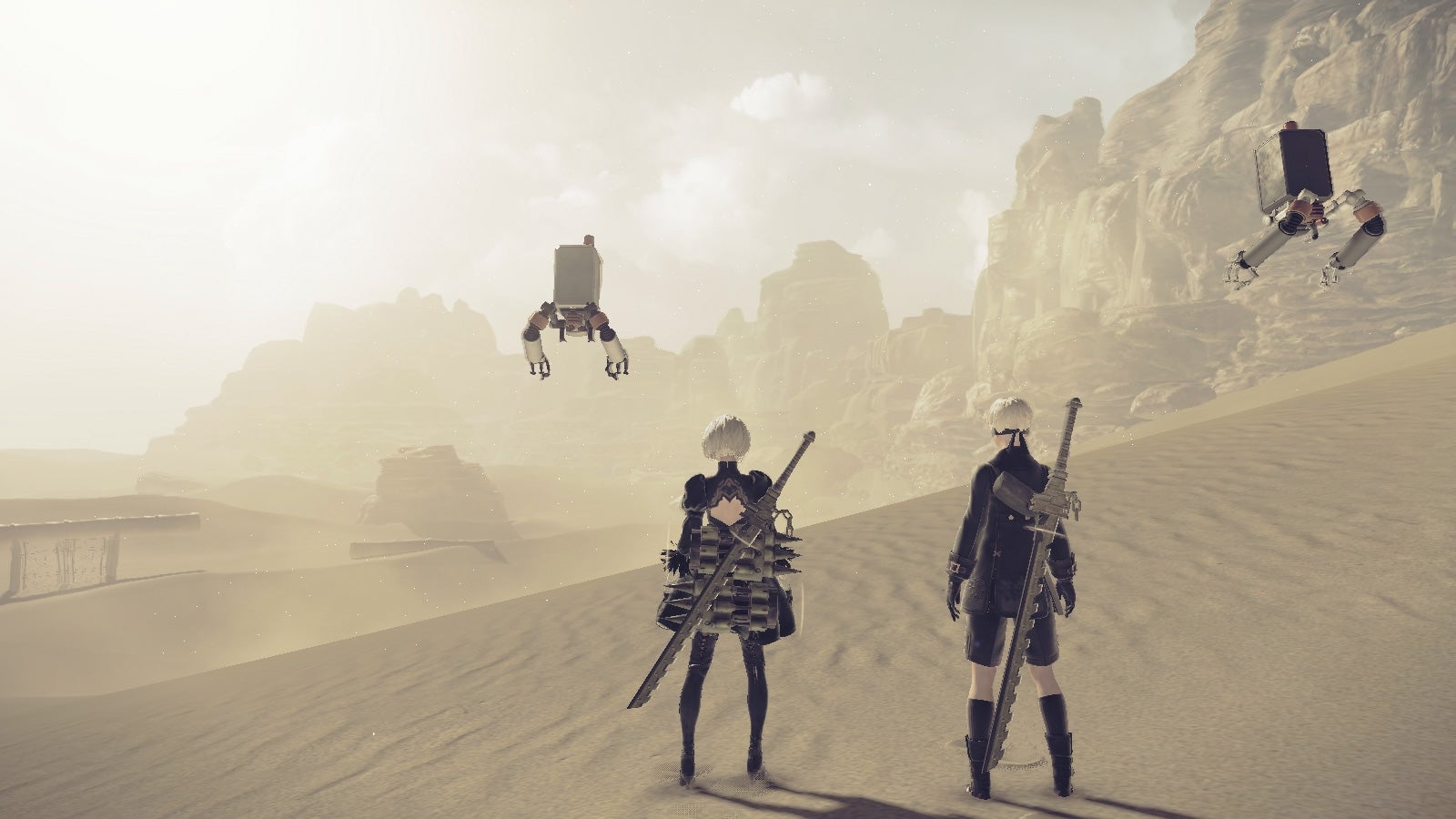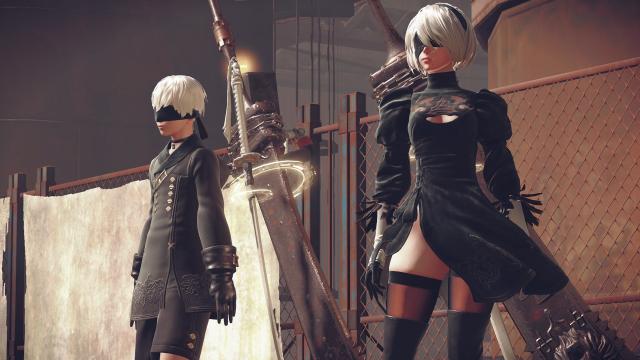2B dies a lot.
For Nier: Automata’s fetish-maid-android-samurai, death is just another occupational hazard of waging an endless war on bulbous robots that stole Earth from a seemingly exiled human race. She’s ready and willing to blow herself up to see the job done because she’s done it before. She has a black box, a record of her experiences, that will be uploaded back to the android home base so she can slide into a brand new body and keep on going. And when dying is part of your daily routine, what’s one more death? At the end of Automata we get a concise, surprising answer: One more death might be the only thing that matters, in 2B’s life and in the game.
The banality of endless resurrection does at least seem to be traumatic for 2B when it’s occasionally disrupted. While she’s more than willing to blow herself up to off a couple of red-eyed robots at the beginning of Automata, she seems disturbed by the fact that her companion, 9S, has to explode along with her, only his death comes before his most recent memories can be uploaded. When she meets him later in the android base orbiting a desiccated earth, she still seems rattled even though 9S is walking, talking, and ready to rejoin the fight. So he doesn’t remember fighting a couple of building-sized robots with buzzsaw arms? What’s one more death if he is, for the most part, fine?
But 2B is disturbed by the loss of 9S’ waking time. When she meets him again, she’s flustered and awkward, not sure how to behave after realising he doesn’t remember the very real intimacy they shared when self-destructing. At the same time, her tone is knowingly formal; she’s clearly done this dance before. Her experience is different — more painful, more tedious given the discomfort of her circumstances — but ultimately the same as 9S’. There’s no miracle to observe, just a job to do because there’s nothing that special about the fact that they were conscious, then not, then conscious again. For them, death just stops meaning anything. It’s brushing your teeth before bed. It’s stopping at the same coffee shop every day and not learning the barista’s name.
The permanence of death and its implications on life sit at the heart of Automata’s obsession with classical existentialist philosophy, something it wears on its sleeve even beyond 2B’s Hamlet-sourced name. After she and 9S are reunited, they go into a desert where she has to ferret out an enclave of robots who “don’t feel anything,” at least according to YoRHa, the organisation running this android military operation. When you find them, the clanky little cylinders with their glowing eyes are pantomiming humanity at its biological basic. They’re rutting, fighting, even rocking a ramshackle cradle to try and sooth an imaginary baby to sleep, all before they start begging the androids not to kill them. After that, 2B finds a village of robot pacifists. Their leader is named after mathematician and theologian Blaise Pascal, and a robotic Jean Paul Sartre lives in his village.
Automata pummels you with this sort of iconography, but it eventually becomes clearer that while the game seems to be about what it means to be alive, it’s actually about what makes mortality, the threat of real permanent death, precious. Unlike 2B, the robots are ultimately mortal. They may only get the opportunity to mimic people, stuck in the shapes they were built in, but they can still end. It drives them to change, to try and be something new. This is how we get harlequin robots keeping an old theme park running and monarchistic robots that get frustrated when their designated baby-king doesn’t grow up. They fail constantly, but they also strive to be more than what they already are because they know they can end. They’re trying to evolve, which is ultimately all anyone’s doing when they get out of bed in the morning.

As Nier finally winds down to its conclusion, it comes out that part of 2B’s function is to ensure 9S keeps dying and coming back with only part of his memories intact because he has repeatedly discovered a horrible truth: Humanity has been dead for ages and so have the aliens that built the robots. What’s more, the androids and the robots aren’t demonstrably different at a basic level. 2B has been fighting for nothing in a world that never changes, denied the opportunity to actually have a life defined by the tangible threat of it all being taken away. If you play through to the game’s true ending, though, she and 9S finally get a chance to free themselves from their horrific version of a Dharmic wheel and have a life that matters.
During this conclusion — one of 26, ranging from temporary breaks between chapters to gags where walking away from a simple fight stops the story dead in its tracks — 2B is guaranteed to live. The Pods, tiny AI companions that follow 2B and 9S, save their lives and give them a chance at a war-free life on whatever’s left of Earth. The final challenge of the game has you blasting your way through the credits as a tiny ship, shooting away hostile data that’s trying to prevent the heroes from being reborn into that life.
It’s almost impossible to succeed without other ships swooping in to help. While there isn’t actually another person controlling that ship on the other end of your internet connection, each of these allies carries the profile of another Nier player. Their network handle displays above the android blasting alongside you and, like other inactive android bodies you see throughout the game, they’re indistinguishable from each other beyond that name. But the sense of togetherness in this final battle, when every shot brings you closer to another chance for 9S and 2B, is intense. It’s yet another moment where the game seems to be shouting about how life, even if it’s artificial, matters.
These barely identified helpers represent so much more than just a fleeting feeling of communion in a dramatic story turn. After all the credits have rolled, after you’re safe knowing that 2B and 9S get to live, after all the goofy robots and the deserts and the moose living among ruined skyscrapers have faded away into the background, Nier: Automata lets you make one last choice. It asks you if you’re willing to delete your game. The moment isn’t dramatic. There isn’t a choral swell in the soundtrack or a spectacular light show, like during the climactic shoot out. There’s simple narration, in the voice of one of the Pods, and plain text on screen not dissimilar to every other menu you’ve used. Nier just wants to know if you’re willing to give up dozens of hours of play — all the optional vignettes you chased, the weapons you collected, your access to the many corners of this tale and its almost empty Earth — in order to help someone else finish the game.
That choice is everything in Nier: Automata. This is the one death that matters, the death that gives both the story and its heroes the definition they deserve. In giving up your life built in the game, suddenly the player gets to share the existential plight of these characters. Automata is asking you to decide for yourself what the purpose of your time has been. Is the point to get every item, to see a “100%” marker, to have some kind of digital trophy sitting in an electronic box in perpetuity? Or is it recognising that everything is impermanent, that your time with the story, like all of your time sparking, is limited and precious?
Nier: Automata doesn’t pass a value judgment on whatever choice you make. The game repeatedly stresses that there’s no hidden reward for sacrificing yourself, and no one else will know definitively that you chose to make the sacrifice. But in giving you the choice at all, Nier is elevated from a clever and earnest meditation on existentialism to a deeply personal exploration of what it means to have little time being anything at all.
2B and 9S get to have a life after you make that choice, and you’ll never get to see any of it; there’s no server waiting to back up their memories, no pointless war to wage, no traumatic need to forcefully perpetuate that war forever. They get to go on, your time ends, and it’s all worth it.

Comments